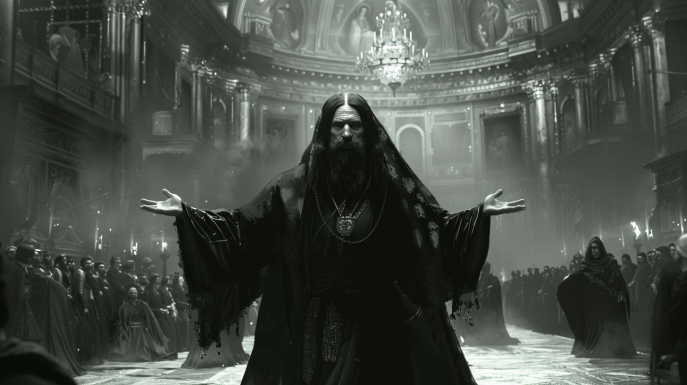Introduction
Grigori Rasputin, the enigmatic Russian mystic, wielded extraordinary influence over the Russian royal family during the early 20th century. His death in 1916 is shrouded in mystery, involving tales of poisoning, shooting, and drowning. This article delves into the complex web of intrigue surrounding his assassination, exploring who truly orchestrated his demise.
Grigori Rasputin: The Man and the Myth
Rasputin was born in 1869 in Siberia, and his early life was marked by spiritual wanderings and mystical experiences. He eventually made his way to St. Petersburg, where his alleged healing powers caught the attention of the Romanov family. Rasputin’s ability to alleviate the suffering of the hemophiliac heir, Alexei, earned him the unwavering trust of Tsarina Alexandra.
Rasputin’s Influence Over the Romanovs
Rasputin’s position as a healer quickly translated into political influence. Tsarina Alexandra relied heavily on his counsel, which extended beyond spiritual matters into the realm of state affairs. This influence sparked controversy, as many nobles and politicians viewed Rasputin as a dangerous interloper whose advice threatened the stability of the Russian Empire.
Growing Opposition to Rasputin
The aristocracy’s distrust of Rasputin grew as his influence over the royal family became more apparent. Nobles, politicians, and even members of the clergy saw him as a corrupting force. Public perception, fueled by sensationalist media, painted Rasputin as a licentious and manipulative figure, deepening the animosity towards him.
The Night of Rasputin’s Murder
On the night of December 29, 1916, a group of nobles, led by Prince Felix Yusupov, lured Rasputin to Yusupov’s palace under the guise of a social gathering. The plotters included Vladimir Purishkevich, a staunch monarchist, and Grand Duke Dmitri Pavlovich, a relative of the Tsar. Their goal was to end Rasputin’s life and his influence over the Romanovs.
Yusupov’s Role
Felix Yusupov, a wealthy aristocrat, played a central role in the murder. According to his account, he initially poisoned Rasputin with cyanide-laced cakes and wine. When the poison seemed ineffective, Yusupov shot Rasputin multiple times. His memoirs provide a detailed, albeit dramatized, narrative of the events.
Purishkevich’s Involvement
Vladimir Purishkevich, a fervent nationalist, was driven by a desire to protect the monarchy from Rasputin’s perceived malign influence. After Yusupov’s attempts failed, Purishkevich shot Rasputin again, believing he had finally killed the mystic. His political motivations were clear: to remove a destabilizing element from the Tsar’s inner circle.
Dmitri Pavlovich’s Part
Grand Duke Dmitri Pavlovich, a cousin of the Tsar, also participated in the plot. His involvement stemmed from both personal animosity towards Rasputin and a sense of duty to protect the royal family. Pavlovich’s role was crucial in securing the participation of other conspirators.
The British Connection
One of the more intriguing theories suggests British involvement in Rasputin’s assassination. Some historians speculate that British intelligence, fearing Rasputin’s influence over Russia’s war efforts during World War I, orchestrated the murder. Evidence for this theory is circumstantial, involving cryptic references in British diplomatic communications, but it remains a point of debate among scholars.
Rasputin’s Resilience
Rasputin’s reputed resilience on the night of his murder has become legendary. Despite being poisoned, shot multiple times, and finally thrown into the icy Neva River, some accounts suggest he struggled to survive. This narrative of Rasputin’s tenacity has contributed to his mythic status.
Post-Mortem Examination
The autopsy on Rasputin’s body revealed multiple gunshot wounds and water in his lungs, suggesting he was still alive when thrown into the river. However, discrepancies in the autopsy report have fueled further speculation and mystery surrounding the exact cause of his death.
Historical Impact of Rasputin’s Death
Rasputin’s murder had immediate repercussions for the Russian royal family. It failed to stabilize the monarchy as intended and instead highlighted the deep-seated issues within the Russian Empire. In the long term, Rasputin’s death is seen as a precursor to the Russian Revolution, which would soon overthrow the Romanov dynasty.
Conspiracy Theories and Speculations
Various conspiracy theories have emerged regarding who truly orchestrated Rasputin’s death. Some suggest a broader conspiracy involving not just the immediate participants but also other political factions and foreign powers. Analyzing these theories helps in understanding the complex interplay of motivations behind the assassination.
Cultural Representations
Rasputin’s life and death have been depicted in numerous films, books, and other media. His character is often portrayed as a dark, mystical figure, with his murder depicted as a dramatic climax. These cultural representations reflect and perpetuate the enduring fascination with his enigmatic persona.
Conclusion
The mysterious death of Grigori Rasputin continues to captivate historians and the public alike. While the primary plotters—Yusupov, Purishkevich, and Pavlovich—played significant roles, the full extent of the conspiracy remains shrouded in mystery. Rasputin’s death marked the end of an era and foreshadowed the tumultuous changes that were about to engulf Russia.
FAQs
Why was Rasputin considered dangerous?
Rasputin was seen as dangerous due to his immense influence over the Russian royal family, particularly Tsarina Alexandra. His involvement in state affairs and his controversial lifestyle alarmed many nobles and politicians.
How did Rasputin gain influence over the Romanovs?
Rasputin gained influence primarily through his role as a healer for the Romanovs’ hemophiliac son, Alexei. His perceived ability to alleviate Alexei’s suffering earned him the trust and confidence of the royal family.
What were the main reasons for Rasputin’s murder?
Rasputin was murdered due to a combination of political, personal, and social reasons. Nobles feared his influence over the royal family and believed his removal was necessary to protect the monarchy.
Was British involvement in Rasputin’s death ever proven?
British involvement in Rasputin’s death remains speculative. While some circumstantial evidence suggests a possible connection, definitive proof has never been established.
How has Rasputin’s death influenced popular culture?
Rasputin’s death has been depicted in numerous films, books, and other media.

